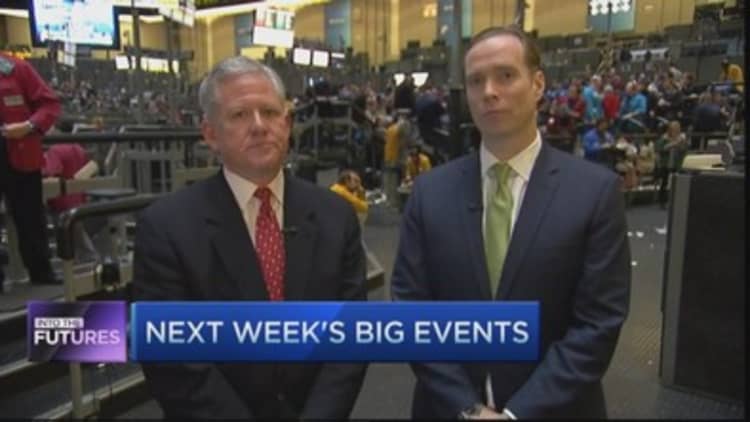
The better economy doesn't necessarily make for the stronger market. For investors who have stuck with US stocks to the exclusion of European and Asian equities, the beginning of 2015 has served as a bitter reminder of that fundamental fact.
Over the first 44 trading days of the year, the S&P 500 Index has risen just 0.6 percent—with no help from an especially rough Friday session. Meanwhile, Japan's Nikkei 225, India's Sensex, and Germany's DAX have each risen some 7 percent.
Some of these gains can be pinned directly on falling currencies. As currencies like the euro and the Japanese yen weaken against the U.S. dollar, assets denominated in those currencies should be expected to increase in nominal value (given that it will take more of these weaker euros, say, to buy the same number of shares).
In "real" terms, the gains do lose a bit of their shine. For instance, theis up 15 percent this year in euro terms, and 5 percent in dollar terms. Of course, that's still double the S&P's run.
"All in all, this underscores the need for U.S. investors to hedge foreign investment in a strong dollar environment," commented Win Thin, global head of emerging market currency strategy for Brown Brothers Harriman.
Read MoreWith dollar at 11-year high, here's what's next
Yet there's more to foreign outperformance than the rapidly rising dollar. While the U.S. economy is one of the strongest in the world, expectations about what large-cap companies will earn (and earnings, after all, are what people buy stocks in order to access) are falling fast.
At the end of 2014, analysts were looking for S&P 500 earnings growth of 8.0 percent; today, the expected full-year growth is a mere 2.4 percent, according to FactSet senior earnings analyst John Butters. Even once plunging energy earnings are removed, expectations have fallen by more than 2 percent (from 11.4 percent to 9.1 percent).
At the same time, most think that America's rapidly improving employment picture will push the Federal Reserve to hike its key federal funds rate target at some point this year. This could tamp down equity gains, and further strengthen the U.S. currency (as holding dollars will become a more attractive proposition once short-term rates rise).
'Nirvana' market?
Across much of the world, the picture is more or less the opposite. While growth in Japan and Europe is nothing to write home about, Japan has at least managed to crawl out of a recession, and German data has impressed.
Perhaps more importantly for risk assets, the Bank of Japan and the European Central Bank are continuing and starting asset purchasing programs, respectively, just as the Federal Reserve is preparing to normalize policy.
Read MoreStrong jobs turn up pressure on Fed to act
"If I said it's 'nirvana' I'm going to jinx everything, but it is this kind of environment" for many global markets, said Jack McIntyre, portfolio manager and senior research analyst with Brandywine Global.
Ironically enough, U.S. stocks may not even be the prime beneficiaries of the American economic recovery.
"Growing consumption in the U.S. is helping growth around the world," he said, pointing to America's hefty share of imports.
In fact, one of McIntyre's favorite investment candidates today is Mexico, given that exports to its northern neighbor make Mexican stocks a "high-beta play on the U.S."
Still, even if investors are confident that they will realize better returns outside the U.S., one burning question remains: To hedge, or not to hedge, currency risk?
Some analysts, like Thin, point out that hedging has given investors much better returns thus far. Others, like McIntyre, says that the dollar's rally has gotten a bit overextended, meaning that it's not a great time to effectively go long the dollar by hedging against currency risk.
Either way, currency hedging has become much easier for the individual investor, given the prevalence of hedged exchange-traded funds like WisdomTree's popular Japan Hedged Equity Fund (DXJ) and iShares' hedged MSCI EAFE ETF (HEFA). Both have delighted investors this year, with 10.8 percent and 9.7 percent rallies, respectively.
"Currencies have moved a lot over the last eight months, and I would expect that dollar strength from here may moderate, as a lot of expectations for divergent central bank policies are now priced in," said Rebecca Patterson, the chief investment officer with Bessemer Trust.
"At the same time, the dollar is not overvalued," and the trends leading to its strength "should continue," so for those investing in countries whose currencies are liquid and have low interest rates (such as the euro, yen, British pound and Canadian dollar) "we'd continue to hedge even here," she said
—By CNBC's Alex Rosenberg.
Watch "Futures Now" Tuesdays & Thursdays 1 p.m. ET exclusively on FuturesNow.CNBC.com!




